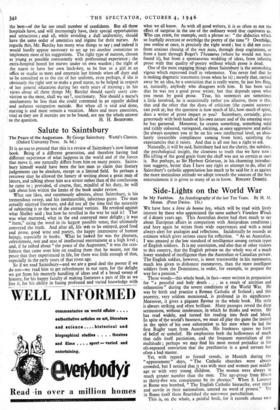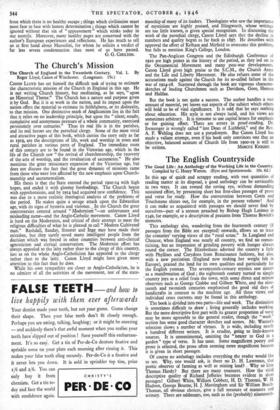Side-Lights on the World War
WE have here a livre de bonne foy, which will be read with lively interest by those who appreciated the same author's Viewless Winds of i dozen years ago. This Australian doctor had then much to say about European affairs in comparison with Antipodean conditions ; and here again he writes from wide experiences and with a mind always alert for analogies and reflections. Incidentally he records an estimate which gives serious cause for reflection. " As an Australian, I was amazed at the low standard of intelligence among certain types of English soldiers. It is my conviction, and also that of other visitors to this country, that the English private on the whole was of a much lower standard of intelligence than the Australian or Canadian private. The English soldier, however, is more -trustworthy in his statements, much less given to dishonest manoeuvres, than the more intelligent soldiers from the Dominions, in order, for example, to prepare the way for a pension."
Those words—this whole book, in fact—were written in preparation for " a peaceful and holy death . . . as a result of attrition and exhaustion " during the severe conditions of the World War. He was by birth and practice a Roman Catholic of Ireland ; and this ancestry, very seldom mentioned, is profound in its significance. Moreover, it gives a piquant flavour to the whole book. His style is always striking and often brilliant. Many passages reveal the deep seriousness, without intolerance, in which he thinks and writes. He has read widely, and turned his reading into flesh and blood. In spite of the world's baseness, we must all play the game (he insists) in the spirit of his own exhortation to his men when he led the first Rugby team from Australia. His frankness spares no form of belief or unbelief. He emphasises both the hollowness of much that calls itself patriotism, and the frequent materialism of the multitude ; perhaps we may find his most rooted prejudice in his oft-repeated conviction that the psychiatrist is a good servant but often a bad master.
Yet, with regard to formal creeds, in Munich during the " appeasement " days, " The Catholic churches were always crowded, but I noticed that it was with men and women past middle age or with very young children. The women were always in much greater number than the men. The age-group from fifteen to thirty-five was conspicuous by its absence." When S. Lorenzo at Rome was bombed, " The English Catholic hierarchy, ever timid and servile in their nationalism, uttered no word of protest." Yet in Rome itself there flourished the narrowest parochialism. This is, on the whole, a painful book, for it records choses vues from which there is no healthy escape ; things which civilisation must meet face to face with honest determination ; things which cannot be ignored without that sin of " appeasement " which stinks today in our nostrils. Moreover, many healthy pages are concerned with the author's European experiences and reflections. He has much to tell us at first hand about Mussolini, for whom he solicits a verdict of far less severe condemnation than most of us have passed.
G. G. COULTON.































 Previous page
Previous page